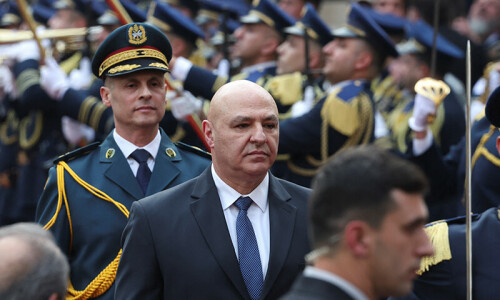LAHORE: It was an exclusive gathering on the first day of the 30th International Conference on Punjabi Literature and Culture where esteemed writers, poets and academics, especially from India and Pakistan, converged to discuss the importance and role of Punjabi language and literature. This year’s conference was dedicated to Baba Guru Nanak, one of the uniting forces of Punjab.
Around 60 Punjabi delegates from India and other countries came to Lahore to participate in the conference being organised by the World Punjabi Congress (WPC) and the Pakistan Academy of Letters (PAC).
Mr Fakhar Zaman, the chairman of the WPC, opened the event in the morning with his keynote address, saying that 29 conferences had been so far held in India, Pakistan and in other countries. He hoped to carry on holding the conferences.
He said Baba Guru Nanak tried to unite the people of the subcontinent through his knowledge and his contribution could not be overlooked.
“Pain, love, emotion, and peace were his teachings. He was a true Sufi saint who countered extremism and led a struggle against it.”
Syed Afzal Haider, a former judge of Supreme Court, read a thought-provoking paper on Baba Nanak. He said Guru Nanak Dev Ji was a messenger of humanity, love and tolerance, which were needed now for strife-torn world.
Dr Deepak Manmohan Singh, the president of Indian chapter of the WPC, said it was a great achievement of the congress to hold such a big conference. He promised to hold the next conference in India.
Darshan Buttar, a poet from India, said he was delighted to be at the conference, especially since this paid tribute to Guru Nanak. Buttar has also won the prestigious Indian national Sahitya Akademi Award in 2012 for his book, Maha Kambani (The Ultimate Trembling).
“The happiness is doubled when we meet people from both sides of the border as we feel the commonalities and the brotherhood between us,” he said.
“The poets and writers get together and discuss literary themes and topics – in the conference and also over a cup of tea. We discuss our issues and our experiences. Rab Karay, Baba Nanak Mehr Karay”
Mr Buttar along with renowned Pakistani writer Ahmad Salim read out poems on Baba Nanak.
Ahmed Salim, a Punjabi and Urdu writer who had also written columns for The Star and Herald, said it was important to note that in India it was extremely difficult for anyone from Pakistan, including esteemed writers like Kishwar Naheed and Salima Hashmi, to visit India.
“This can be taken politically as well but I would like to see it as a significant milestone in terms of culture.”
Salim, who is also a panelist in the conference, would be speaking on second day of the conference on Sufis and how they resisted the status quo, extremism, and fanaticism, staying away from the royal courts.
Writer Uzma said she came because Punjabi was her first language and she appreciated how the conference was unifying the two sides of Punjab.
“We learnt about Sikh religion and Guru Nanak and how much harmony they (Indian and Pakistan Punjabs) have amongst them. Our cultures are similar too. We have been ripped apart because of politics, and this needs to be mended. Literature must be used to bring us together.”
Sukhdev and Dr Bhatia, two writers, also interpreted teachings of Guru Nanak. Sukhdev Singh has recently written a book on Peero Preman, based on a woman from Lahore, who ended up in the red light area and then went on to become a woman who others regarded as chaste.
Sultana Begum from Patiala, India, was also a speaker. A retired deputy director of the Punjab School Education Board said she had visited Lahore in 1993 to attend a conference.
“Lahore’s soil and its people’s love pull us here and we will take the warmest wishes and a message of peace with us.”
Ms Sultana said the conference had covered several themes of literature.
“I became emotional thrice,” she said. “It must have been our bad luck that a boundary on a map tore us apart physically at the Partition but thankfully we are developing good relations today.”
Sultana Begum’s five books have already been published and the sixth is about to be launched.
She said she was the first female Punjabi writer to have adopted shagoofay style of literature. Saadat Hasan Manto and Ismat Chughtai are famous for their Urdu Shagoofay, and even in Punjabi there are some writers but none of them is a woman.
“These are literary sketches, and I write them by name,” she said.
Dr Gurbhajan Singh Gill, a poet from Ludhiana, gave a detailed discourse on Baba Guru Nanak. Others who spoke were Dr Jatinder Kaur, Dr Nabeela Rehman and Dr Saima Batool.
All of them spoke on different aspects of Baba Nanak.
At the end, two documentaries in English, directed by Farrukh Zaman, titled ‘Baba Farid’ and ‘Baba Bulleh Shah’ were shown.
The guests from India will also be taken by the Pakistan Academy of Letters to Nankana Sahib and the Katarpur Corridor besides the Walled City of Lahore on a tour.
Published in Dawn, February 15th, 2020














































Dear visitor, the comments section is undergoing an overhaul and will return soon.